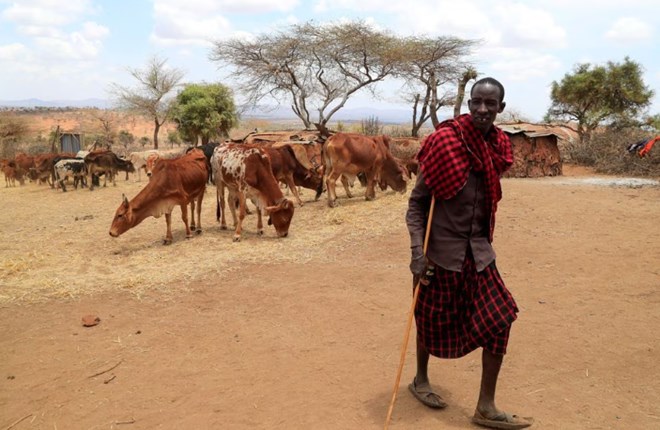
Wednesday April 12, 2023

Ngagati Namaiduk from the Maasai pastoralist community affected by the worsening drought due to the failed rainy season, walks past his emaciated cattle during a dried-hay feeding program at their manyatta (traditional homestead) near Ilbisil settlement of Kajiado, Kenya October 17, 2022. REUTERS/Thomas Mukoya/File Photo
Kenya will spend $140 million to roll out an expanded insurance scheme for livestock farmers to cushion them against the vagaries of frequent droughts, officials said on Tuesday.
The plan is part of a World Bank-sponsored project targeting 1.6 million herders in Djibouti, Ethiopia, Somalia and Kenya, a region which is prone to devastating droughts that occur every two to four years, over the next half a decade.
"Severe droughts cause more than 15% mortality of livestock," Kenya's state department of livestock said during a briefing on the scheme.
The loss of the animals usually translate to billions of shillings in losses and a reduction in annual economic output due to the East African nation's dependence on farming, including rearing of livestock, the department said.
The new scheme, known as DRIVE, replaces a previous livestock insurance scheme in Kenya that was called KLIP, which ran between 2015 and 2021, officials said.
"In Kenya, over 150,000 pastoralists are expected to benefit from the project," the government said.
It will build on the previous one by offering herders who buy subsidised policies not just insurance for their animals in case of drought, but digital payments and savings products to boost their financial wellbeing.
Zep-Re Insurance, a regional reinsurer, will implement the programme on behalf of the government, targeting herders in several arid and semi-arid counties that are usually hardest hit by drought.
The insurance component will be funded by $75 million from the World Bank, with the rest going to a second component aimed at helping herders improve their meat products and look for new markets, officials said.
Reporting by Duncan Miriri; editing by Jonathan Oatis